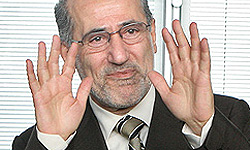 TEHRAN (FNA)- Iraqi National Security Adviser Muwafaq Al-Rubaie here in Tehran on Monday underlined his country’s decisiveness to implement an earlier decision for closing the headquarters of the anti-Iran terrorist group, the Mojahedin-e Khalq Organization (MKO), in Diyala province.
TEHRAN (FNA)- Iraqi National Security Adviser Muwafaq Al-Rubaie here in Tehran on Monday underlined his country’s decisiveness to implement an earlier decision for closing the headquarters of the anti-Iran terrorist group, the Mojahedin-e Khalq Organization (MKO), in Diyala province.
“Iraq has made a decision for Ashraf camp and will implement it firmly,” Rubaie told reporters following his arrival at Tehran’s Imam Khomeini International Airport.
“We have put forward two solutions for them, they either return to Iran or find a third country for exile. There is no third way for them,” he added.
The MKO has been in Iraq’s Diyala province since the 1980s.
The MKO, whose main stronghold is in Iraq, is blacklisted by much of the international community, including the United States.
Elsewhere, the Iraqi official pointed out that “my trip comes in line with an agreement made between Iran and Iraq during Maliki’s visit.”
He indicated that the most important goals pursued in the said agreement are deepening bilateral relations and strengthening relations in line with enhancing political relations.
“I must appreciate the Islamic Republic of Iran’s efforts for the promotion of stability and security in Iraq,” he added.
Rubaie further described non-interference in internal affairs of either country as the most important aspect pursued in Iran-Iraq bilateral relations.
Responding to an FNA question about the fate of the five Iranian diplomats currently in US custody in Iraq, the Baghdad official said that the diplomats will be freed when US transfers them to Iraqi government.
The United States has repeatedly claimed that the government in Baghdad does not intend to expel the terrorist MKO, but Iraqi officials have on different occasions stressed that the group cannot perceive any future for its members in Iraq.
The MKO is on the European Union’s list of terrorist organizations subject to an EU-wide assets freeze, and has been designated by the US government as a foreign terrorist organization. Yet, the MKO puppet leader, Maryam Rajavi, who has residency in France, regularly visits Brussels and despite the ban enjoys full freedom in Europe.
The MKO is behind a slew of assassinations and bombings inside Iran, a number of EU parliamentarians said in a recent letter in which they slammed a British court decision to remove the MKO from the British terror list. The EU officials also added that the group has no public support within Iran because of their role in helping Saddam Hussein in the Iraqi imposed war on Iran (1980-1988).
Many of the MKO members abandoned the terrorist organization while most of those still remaining in the camp are said to be willing to quit but are under pressure and torture not to do so.
A May 2005 Human Rights Watch report accused the MKO of running prison camps in Iraq and committing human rights violations.
According to Human Rights Watch report, the outlawed group puts defectors under torture and jail terms.
The group, founded in the 1960s, blended elements of Islamism and Stalinism and participated in the overthrow of the US-backed Shah of Iran in 1979. Ahead of the revolution, the MKO conducted attacks and assassinations against both Iranian and Western targets.
Leaders of the group have been fighting to shed its terrorist tag after a series of bloody anti-Western attacks in the 1970s, and nearly 30 years of violent struggle against the Islamic Republic of Iran.
In recent months, high-ranking MKO members have been lobbying governments around the world in the hope of acknowledgement as a legitimate opposition group.
The UK initiative, however, has prompted the European Union to establish relations with the exiled organization now based in Paris. The European Court of First Instance threw its weight behind the MKO in December and annulled its previous decision to freeze its funds.
The group started assassination of the citizens and officials after the revolution in a bid to take control of the newly established Islamic Republic. It killed several of Iran’s new leaders in the early years after the revolution, including the then President, Mohammad Ali Rajayee, Prime Minister, Mohammad Javad Bahonar and the Judiciary Chief, Mohammad Hossein Beheshti who were killed in bomb attacks by MKO members in 1981.
The group fled to Iraq in 1986, where it was protected by Saddam Hussein and where it helped the Iraqi dictator suppress Shiite and Kurd uprisings in the country.
The terrorist group joined Saddam’s army during the Iraqi imposed war on Iran (1980-1988) and helped Saddam and killed thousands of Iranian civilians and soldiers during the US-backed Iraqi imposed war on Iran.
Since the 2003 US invasion of Iraq, the group, which now adheres to a pro-free-market philosophy, has been strongly backed by neo-conservatives in the United States, who also argue for the MKO to be taken off the US terror list.
 Eurasia Press & News
Eurasia Press & News